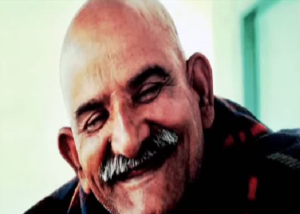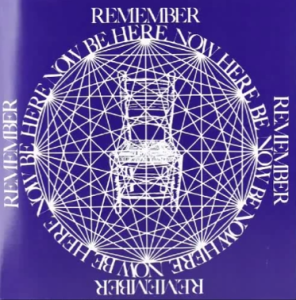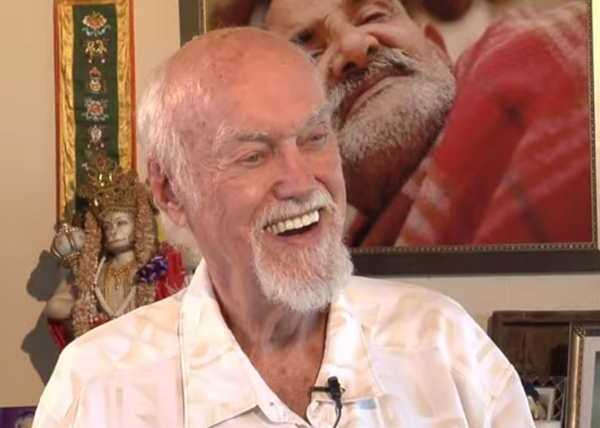Ram Dass has been around the world, lived several lives and experienced consciousness in many forms. What he has found is enlightenment in love and service.
If you could engineer a man who was simultaneously so brilliant, so ahead of his time and so concerned with higher consciousness and enlightened living that he became a Harvard professor, a counter-culture icon and a spiritual luminary in one lifetime, that man would be Ram Dass. It sounds like a lot to accomplish. It sounds almost impossible for an ordinary human being to live such a life, but Ram Dass is far from ordinary, and this has been his life thus far.
He was born Richard Alpert in Newton, Massachusetts in 1931, and, given his home environment, it seems he was destined to be an intellectual. His father, George, was a reputable lawyer who also helped to found Brandeis University and eventually became president of the New York, New Haven & Hartford railroad.
In one interview, George Alpert addressed the fact that his son always had a strong mind of his own and that he was not influenced by the opinions of others, including his father. George said, “He makes his decisions on what he thinks is right and true.”
Ram Dass did take, at least, one cue from his father. He became well educated. His impressive resume as an academic includes a Bachelor’s degree from Tufts University, a Master’s degree from Wesleyan University and a PhD, in psychology, from Stanford University.
Following his formal education, he was hired as a professor of psychology at Harvard University in Cambridge in 1958, where he taught in the Department of Social Relations and the Graduate School of Education. It was there that he specialized in human motivation and personality development, even co-authoring his first book, Identification and Child Rearing, and it was there that his path toward realizing the nature of consciousness truly began when he became friends and research partners with Timothy Leary.
Beginning in 1961, the pair, along with Ralph Metzner, Aldous Huxley and Allen Ginsberg, conducted research on human consciousness using hallucinogens, such as psilocybin (found in mushrooms) and LSD, in their experiments. The research led to the publishing of two books, The Psychedelic Experience (co-authored with Leary and Metzner and based on the Tibetan Book of the Dead) and LSD (co-authored with Sidney Cohen and Lawrence Schiller).
This period of expanding his mind using chemical substances would be Ram Dass’ (at this time still Richard Alpert) precursor to seeking spirituality and the origin of consciousness. Prior to this period, he defined himself as an atheist. He has been quoted as saying, “I didn’t have one whiff of God until I took psychedelics.”
While their research may have been groundbreaking, it proved to be too controversial for Harvard at the time, and Alpert and Leary were dismissed from the university in 1963. They continued their experiments in consciousness privately and became heroes of the counter-culture for their efforts. While Leary spent the rest of his life advocating the use of hallucinogens, Alpert was seeking something more. He was far from satisfied with his spiritual life as he had many unanswered questions.
 His search for those answers took him to India in 1967, where he met his guru, Neem Karoli Baba who was called Maharaj-ji by his loving followers. Alpert, who was taken to Maharaj-ji by another westerner, Bhagavan Das, was skeptical upon first meeting the holy man.
His search for those answers took him to India in 1967, where he met his guru, Neem Karoli Baba who was called Maharaj-ji by his loving followers. Alpert, who was taken to Maharaj-ji by another westerner, Bhagavan Das, was skeptical upon first meeting the holy man.
When they arrived at the temple, Bhagavan Das immediately got down on his stomach and kissed Maharaj-ji’s feet in a show of respect to a living saint, but Alpert hesitated. He was a pragmatic former Harvard professor who was not about to just kiss someone’s feet. He needed some kind of proof that this man was as special as he was proclaimed to be, and Neem Karoli Baba gave him that proof.
 Maharaj-ji was known for performing miracles, and the guru recounted for Alpert how, on the previous night, during a stop on the journey to the temple, he had been staring at the stars and thinking of his mother who had passed away six months earlier. In complete awe of the guru’s knowledge of him, Dass describes this experience as the moment that his mind was quieted, his breakthrough.
Maharaj-ji was known for performing miracles, and the guru recounted for Alpert how, on the previous night, during a stop on the journey to the temple, he had been staring at the stars and thinking of his mother who had passed away six months earlier. In complete awe of the guru’s knowledge of him, Dass describes this experience as the moment that his mind was quieted, his breakthrough.
Alpert decided to stay with Neem Karoli Baba and learn from him. In Maharaj-ji’s presence, Dass felt loved and accepted, and in turn he felt a great deal of love for others. It was through the guru’s teachings that he adopted bhakti yoga, which is a form of meditation in which one concentrates on the divine in a show of devotion (in this case to the Hindu deity Hanuman). Maharaj-ji also gave Alpert the name Ram Dass, which means servant of God.
During his time with Maharaj-ji, Dass asked him, “How do I get enlightened?” And the guru’s reply was, “serve people and feed people.” This would become the central principle of Dass’ spiritual practice. Seva, which is service to others, is considered the highest form of devotion to God in the Hindu religion, and Dass has been leading a life of service since. However, the practices that Ram Dass has adopted are diverse, having learned from his teacher that consciousness comes in many forms.
In addition to bhakti yoga and seva, Dass subscribes to Buddhist meditation, Mahayan Tibetan and Zen Buddhist schools, Sufi and Jewish mystical studies and karma yoga (a form of yoga that seeks to achieve perfection in motion in a form of altruistic spiritual service). Over more than four decades of teaching, Ram Dass has championed the philosophy that everyone has enlightenment within them and that divine love can be experienced without dogma.
In 1971, Ram Dass wrote the book that would become, and still is, the most recognized guide on how to live in the present moment for people seeking spirituality. Be Here Now is an account of Dass’ own spiritual journey as well as a collection of spiritual techniques, quotes and books that he recommends.
 In addition to Be Here Now and several other celebrated books, Ram Dass has spread his message and love by founding several service organizations.
In addition to Be Here Now and several other celebrated books, Ram Dass has spread his message and love by founding several service organizations.
He founded the Hanuman foundation in 1974. The charitable organization was created to cater to the spirit of service. It spawned the Prison-Ashram Project, today known as the Human Kindness Foundation, which aided incarcerated people in spiritual growth during their time in prison, the Dying Project, which helped prepare people for death by bringing awareness and compassion to those about to encounter it, and the Dying Center, who’s mission was to educate people on conscious dying.
Today, the Living/Dying Project, which has headquarters in California’s Bay Area and is run by the same person who directed the Dying Center, supports the philosophy that an encounter with life-threatening illness can be a call for spiritual awakening.
Ram Dass also acts as co-founder and advisory board member for the Seva Foundation. This international service organization has helped to eliminate curable blindness in India and Nepal, aided in the resurrection of agriculture in poor Guatemalan villages, supported primary health care for American Indians and been the mouthpiece for awareness about homelessness and environmental issues in the United States as well as other countries.
For over 50 years, Ram Dass has been a student and a teacher of spirituality and heightened consciousness. He has reached and helped millions of people throughout several generations.
In 1997, not long after starting a radio show to share his teachings, Ram Dass had a stroke that almost took his life. He was left paralyzed on his right side, and he now suffers from expressive aphasia, which makes it difficult for him to speak. He regards his encounter with ill health as an act of grace, and although he can no longer travel, he continues to help others by teaching online and conducting retreats where he resides in Maui. Now 83 years old, he still serves and feeds people to this day, and he embodies the proliferation of love and altruism.
[images: featured image, via video interview; google images and Scott Cresswell on flickr]


